- Home
- Al Sarrantonio
Halloweenland Page 20
Halloweenland Read online
Page 20
He cleared his voice and she turned around, startled.
“Oh! Detective Grant!”
Grant smiled. “Sorry.”
She smiled, too, and regained her composure, handing Grant the trowel she had plucked from the wheelbarrow. “Would you carry this for me?”
She walked past him, and led him back to the side of the house, where a tangle of dead weeds and still-blooming annuals clogged a small plot.
“It’s a mess,” she explained, taking the trowel from him. “I pretty much ignored it this year. But I thought going at it might be good for me. For the plants, too.”
“Marianne, why didn’t you tell me you were five months pregnant?”
She had knelt down to plow at the black loamy soil, and looked up at him. “Because I didn’t know. I didn’t know until the day after Jack died. I started to feel sick, and then I started to show. And every day I seem to show more.”
Grant heard a car door slam. He turned to see Marianne’s sister Janet trudging toward them over the lawn. In the backseat of her Buick, Baby Charlie waved his arms from his car seat. His face was red and he looked to be wailing, but the closed car and the distance prevented him from being heard.
Janet stopped and put her hands on her hips, regarding Grant. “You again! Just the man I want to see!” She reached out and grabbed Grant by the elbow, tugging him away. As Marianne began to rise Janet pointed at her. “You stay there. I’ll be back in a few minutes and take you to lunch.”
Marianne obeyed, and Grant was hauled over the front lawn toward his car, parked in front of Janet’s. She had a grip like a bench vise.
She let go of Grant’s arm and faced him.
“Actually,” Grant said, “you’re the one I want to see. Did you know your sister was five months pregnant?”
“Five months my ass.” She pointed to her own belly. “I’m seven months pregnant, and I’ve been puking since day one.” She jerked a thumb at the Buick. “Same thing happened with Baby Charlie. Puking and feeling like puking for nine months straight, and showing after two. Big as a house. It runs in our family. Nobody escapes it. And I’m telling you, Marianne wasn’t pregnant five months ago. I would have known. I’ve got radar. I can sense it. When she started to feel sick after Jack died, then I knew she was pregnant. But she wasn’t till then. She couldn’t have been.”
“Why?”
“Jack had a vasectomy when they got married. In fact, he had it reversed the day he died. He and Marianne had decided to have a kid. Marianne told me he’d promised to come home early that night, so that they could start trying to get her preggers. But instead he went out celebrating with those two asshole friends of his. Macho manhood and all that crap. Did I mention I’m glad Bud Ganley is dead? One less loser in the world.”
“Is there any chance Marianne was having an affair, and got pregnant five months ago?”
“Ha! My sister? She was wild crazy in love with Jack Carlin, and he was the same with her. No way in hell.”
She put her hands on her hips again. “My turn. You’re the guy who knows all about the weird stuff in this town, right?”
“Well—”
Janet didn’t let him continue. “Marianne’s been acting just plain strange. And getting stranger. She tell you about the guy with the cape?”
“She came to see me right after it happened. I’ve been calling her on the phone every few days since then to make sure she’s all right. Every time I phone her, she says she’s fine.”
“Oh, you need to catch up, Detective. This cape character’s been back just about every night. Now she says he’s her friend, and that she’s not afraid of him anymore. She even calls him Samhain. I stayed with her one night in her bedroom, but didn’t see a damned thing but that dog shit ugly wallpaper of hers. The next night she claimed he was back. Either she’s nuts, or there’s still something mighty screwy going on.”
Grant said nothing.
“It’s like she’s in a fog. A couple weeks ago, she was just beginning to show. Now she’s almost as big as me.” Janet took a deep breath. “The thing I want to know is: if she’s pregnant, five months or otherwise, how the hell did it happen?”
“I don’t know.”
“Well, I’ve said my piece,” Janet continued, shaking her head, “and now you know everything I do. I gave you that stuff of Jack’s you asked for when I was cleaning out the house, and I’ll help any other way I can. I think my sister would have been just fine by now, after Jack’s death, if all this other monkey business hadn’t started. I’m worried about her, but I don’t know what to do. Maybe you can worry about her, too. Between the two of us we can do a lot of worrying.”
She turned and shouted to Marianne, “Come on! Let’s go eat! I’m starving!”
Marianne threw down her tools and stood up. She looked even more pregnant than she had when Grant arrived.
Janet was shaking his hand. “Thanks for listening, Detective.”
She dropped Grant’s hand, and trundled over to help her sister into the front of the Buick.
Grant couldn’t help but be struck by how much bigger than her sister Marianne looked.
FIFTEEN
“You’re sure, Mort?”
“Ninety-nine point nine percent. I’m positive if we did the full test every marker would match. This is the guy, all right.”
Grant was silent.
“Just to make sure,” Mort said, “I took samples from both the hairbrush and the toothbrush. Same result.”
Grant made a sound that was something like, “Thanks.”
“And you said this guy was her husband? If he was dead how could he—”
Grant said, “Exactly,” and hung up the phone.
SIXTEEN
It always seemed to rain at burials. There was a blue tarp over Bud Ganley’s casket, which Grant had no doubt was a cheap one. There were only a handful of mourners: Ganley’s mother, his employer, Jim Ready, a couple of like-aged slouchers who looked like pool room buddies, and Petee Wilkins, who stood off by himself. Grant had made his way into the back end of the cemetery, through a small stretch of woods, and stood at the top of a moderate rise looking down at the proceedings below. His raincoat collar was up against the chill, and his cigarette was used up.
He lit a new one and watched as the reverend finished his ministrations and the two slouchers, who turned out to be the grave diggers, began to lower the casket into the ground. They pulled the blue tarp off it then, and Ganley’s mother threw a clod of dirt on it and turned away, not looking at Petee Wilkins. The way she walked told Grant that this was the last in a long line of disappointments.
Petee stood watching as the two grave diggers began to shovel the mound of waiting dirt into the hole. Grant ambled down the hill and approached him. Too late to flee, Petee noticed him and stood rooted to the spot, looking at the ground. Grant was struck by how much Wilkins looked like a skinny rat, down to the twitching nose and sniffles. He had always been a follower. Grant had first met him when Wilkins was twelve, and got caught trashing a house on Sagett River Road. The punk he was with got away, but Petee got caught. He was the kind who would always get caught.
“ ’Lo, Detective,” Petee said, running the back of his hand across his continually running nose. He wouldn’t look up.
“I just have one question to ask you, Petee,” Grant said.
“Sure. Whatever.”
“I want you to tell me the dead-ass truth, and if you do I won’t bother you again. That’s a promise.”
Petee’s nose twitched, and his shoulders spasmed up and down with what might have been a form of assent.
“Okay?” Grant asked.
“Sure.”
“Just answer me this. Did you and Bud Ganley take Jack Carlin home before you took him to the hospital?”
Petee drew the back of his hand quickly across his running nose. His nose twitched twice. “No, Detective Grant.”
“Are you sure? Look at me, Petee.”
Wilkins glan
ced up briefly. Even his dark brown eyes were small and ratlike. “He wanted us to, but we didn’t!”
“He was alive after that car hit him?”
Petee was staring at the ground again. Behind them, the two grave diggers went about their work, which lent a susurrus of shoveled dirt to the conversation. “Yeah, but just for a couple of minutes. At first he begged us to take him home. Then he got all glassy eyed and kept calling for Marianne, saying he had to go to her. That he had promised. He started yelling a bunch of stuff.” He glanced up at Grant briefly again. “Then he was gone. He died right there in the street before we put him in Bud’s car and took him to the hospital.”
“Why didn’t you tell the police that he was alive after the car hit him?”
Sniffle, wipe. “Bud was afraid we’d get in trouble. And I was afraid.”
“Afraid of what?”
Twitch, shrug. “Afraid . . .”
“Tell me, Petee, or we end up down at the station with you in a holding cell.”
“Oh, shit.” He shuffled his feet, looked back at the grave diggers, who were wiping their hands, stared at the ground again. Grant noticed that his knuckles were white, his hands trembling. “Afraid . . .”
“Petee—”
“I was afraid of what he said, and what happened! I believed Jack, is all! Bud ran to get his car, and Jack was all busted up and dying, and he stared right through me and was yelling, ‘I promised you a baby! I promised!’ And then . . .”
“And then what?”
“And then he died, and . . .”
Grant was about to prod him again when Petee blurted, with a groan, “And something flew out of his body and away, Detective! Smoke, or fog, or . . . something that looked just like Jack!”
“Petee—” Grant began.
“Aw, shit, Detective,” Wilkins said, wiping his nose and then his eyes. He was crying now. “Can’t you leave me alone? Can’t you just leave me the hell alone? All my friends are dead now, and my life is shit. Can’t you just lay off me?”
Grant took a long breath, and said, “Sure, Petee. Like I promised.”
Wilkins turned abruptly, almost stumbling into one of the grave diggers, who was loading his shovel into a wheelbarrow, and walked off, hitching sobs and wiping at his face with his hands.
Grant stared after him for a moment, then turned and made his way up the slope, lighting a cigarette. The rain had turned to a chill mist, coating fallen leaves and making their brilliant colors slick. The trees were almost denuded now.
It was two days till Halloween.
SEVENTEEN
Grant had never heard Doc Williams sound flustered, let alone frightened. But frightened was what he sounded on the phone.
“You’ll come to see me right now, Bill?”
“Of course. But why don’t you just tell me—”
“Not on the phone. And for God’s sake not in the office. I’ll be in the coffee shop in the strip mall across the street.”
“I’m on my way.”
Williams was not there when Grant walked into the coffee shop, but he walked out of the men’s room a moment later. He was pale as a sheet, and looked unwell.
He motioned Grant to the booth farthest from the counter, in an empty corner of the shop. Grant sat down and the laconic waitress, chewing gum, ambled over and asked him if he wanted anything. “Doc here already ordered coffee for ya, new pot’s brewin’, be a few. Any pie? Cake? Pumpkin pie’s good t’day.”
She stared over his head, and Grant told her that just coffee was fine.
“Be back when it’s ready.”
She turned and shuffled back to the counter, where an open newspaper awaited her.
Grant turned his attention to Williams. “Let me guess before you tell me. Marianne Carlin is more than five months pregnant.”
To his surprise, Williams nodded and waved that off. “Yes. Actually, she’s almost reached term. I’m not even going to try to explain it.” Williams stared straight into Grant’s eyes. “I was threatened, Bill.”
“By whom?”
“He was . . . very insistent. Told me that if I went near Marianne again he would kill my family, and me. And . . . he told me not to go to the police for help.”
Williams glanced nervously past Grant to the front window. At that moment the waitress was shuffling toward them with two mugs of steaming coffee, which she set down ungracefully, managing to spill onto the table.
“Sure you don’t want to try the pumpkin?” she asked, not quite stifling a yawn.
Doc said quickly, “Thanks, May. We’re fine.”
She turned and shrugged, shuffling back to the counter. “It’s real good pie . . .”
“Why did you call me, Doc?”
“Because he said I could tell you, and only you. He said to tell you his name was Sam.”
Samhain.
Doc Williams was still talking, and Grant had missed some of it.
“. . . on the telephone. I thought it was a prank at first. I was sitting in my office, and picked up the receiver, and my hand up to my elbow went cold, as if it had been plunged into ice water. I thought for a second I was having a stroke. The voice told me what I just told you, and then said to tell you that Marianne Carlin was to be left alone until Halloween was over. He said you would understand. And that was it. When I put down the phone receiver my arm was back to normal, not ice cold anymore.”
Williams looked at Grant with a special pleading. “In the afternoon, when I was leaving for my rounds at the hospital, something was waiting for me next to my car in the parking lot behind my office. It was this ‘Sam’ creature, all black swirling shadows and a white face like a horrid Halloween mask. He repeated what he’d said and told me to call you. He came up close to me and his breath smelled like . . . nothing. Like empty space. I thought he was going to kill me on the spot. What the hell is going on, Bill? Would this thing really hurt my family?”
“Yes,” Grant said. “I think he would. Do what you were told. Let me worry about Marianne Carlin.”
Williams stared at his untouched coffee. “I’ve never seen anything like this, ever, Bill! I’m a doctor! Who the hell is this ‘Sam’?”
“He’s the thing you fight every day, Doc.”
EIGHTEEN
Grant’s finger was getting numb from pressing the doorbell at Janet Larson’s house. He’d peered through the front windows—everything looked normal, a scatter of toys on the rug, a half-empty bottle on the coffee table in the living room, a changing bag nearby. There was a Buick in the driveway, the same one Grant had seen at Marianne’s house. The doors, front and back, were locked. An uncarved pumpkin sat on the porch next to the door, the outline of a to-be-cut face fashioned in magic marker.
“Y’ won’t find ’em there, mister!” a voice called, and Grant turned to see an old woman staring at him from the property next door. She had stopped precisely at the border between the houses, next to her driveway. She had a face like a lemon, and Grant noticed that there was no pumpkin on her stoop.
“Do you know where Mrs. Larson is?” Grant asked, stepping down from the porch to better talk to her.
“Left early this mornin’, the whole bunch of ’em! Piled into the SUV like Satan was chasin’ ’em. Kid squawking like always.”
“Do you have any idea where they went?”
The old woman made her face look even more sour, turned around, waved her hand in dismissal. “No idea, ’cept they had a couple bags with ’em. Usually means they’re off to New Hampshire, to his brother’s in Derby. Only place they ever go.” She stopped and turned around, making a sudden fist and shaking it at the house. Her face became very red. “Used t’ take in their paper when they went away, but they’re ingrates! Not even a thank-you! Young and selfish.”
Her face lost its color, and she turned and walked slowly back to her house. “Well, they’ll get what they deserve when they don’t dish out any candy to the little monsters tomorrow and the house gets egged.”
Th
ere were three Larsons in Derby, New Hampshire, and the second was the right one. After some negotiation with Chuck, Janet’s wife, Janet finally got on the phone.
“Make it quick, Detective. Baby Charlie needs a change.”
“Why did you leave so quickly?”
There was a long silence on the other end of the phone. “Let’s just say I was asked to.”
“By whom?”
“He said he knows you. He also said he’d kill Chuck and Baby Charlie if we didn’t go.”
“Did you—”
“I don’t have time for this, Detective. I’m too busy being scared to death. As you’ve seen, I put on a good bluff, but underneath I’m just a grade-A chickenshit like most people. I believed what I was told.”
“When—”
“I stayed at my sister’s house again last night, Detective. Most of the night there was nothing to look at in the corner of her bedroom but that ugly wallpaper. And then there was something else. And, well, here I am.”
“What if your sister needs you?”
“She’s on her own, now. All she did was coo and sing, anyway, when this thing appeared. He seemed pretty fond of her, too. Me, I don’t like ghost stories, much less the real thing.”
Grant started to ask another question, but the line went dead.
NINETEEN
Riley Gates’ farm was, now, one of the saddest places on Earth. In its prime, when Gates, a former police detective and Grant’s mentor, had been alive, it was a place Grant always looked forward to visiting. When they had both been married, and before Rose became sick, there had been many parties at Riley’s place, and even after Riley divorced and Rose died, Grant had still considered Riley Gates’ one of the finest men he had ever known.
But now . . .
Driving past the long-closed farm stand on the main road, with its faded sign RILEY’S PICK YOUR OWN PUMPKINS, and then through the broken front gate over the rutted road and up to the blackened, gutted, burned house, Grant felt nothing but hollow. He parked near the barn, its paint peeling, one door off its hinges and the other ajar. He got out of his car and walked toward the rutted field that, in earlier years, would have been filled today with families picking their last minute Halloween pumpkins. This year only a few misshapen rogue fruits had grown, pale-colored, wilting and untended. There was a cool breeze in the late day kicking up dust devils in the fallow plot. The sky was growing blue-purple, and the sun in the west, directly across the field, looked shimmering orange, like a pumpkin hiding behind a veil.

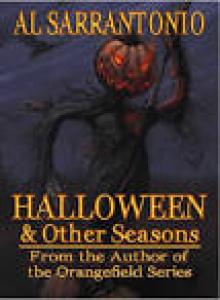 Five World Saga 01 Hornets and Others
Five World Saga 01 Hornets and Others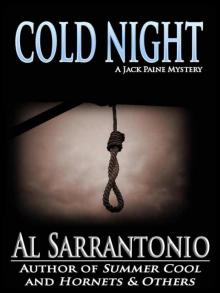 Cold Night (Jack Paine Mysteries)
Cold Night (Jack Paine Mysteries)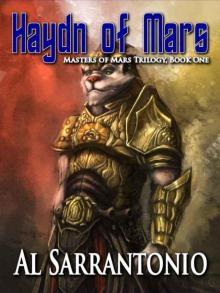 Haydn of Mars
Haydn of Mars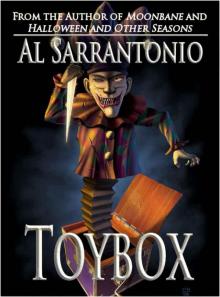 Toybox
Toybox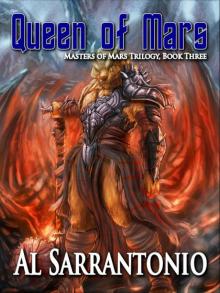 Queen of Mars - Book III in the Masters of Mars Trilogy
Queen of Mars - Book III in the Masters of Mars Trilogy Exile
Exile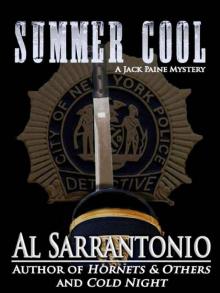 Summer Cool - A Jack Paine Mystery (Jack Paine Mysteries)
Summer Cool - A Jack Paine Mystery (Jack Paine Mysteries) Return - Book III of the Five Worlds Trilogy
Return - Book III of the Five Worlds Trilogy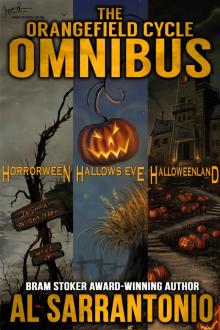 The Orangefield Cycle Omnibus
The Orangefield Cycle Omnibus Summer Cool jp-2
Summer Cool jp-2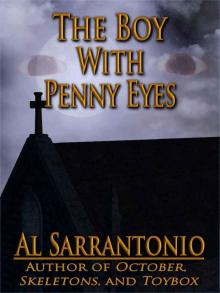 The Boy With Penny Eyes
The Boy With Penny Eyes Journey - Book II of the Five Worlds Trilogy
Journey - Book II of the Five Worlds Trilogy Kitt Peak
Kitt Peak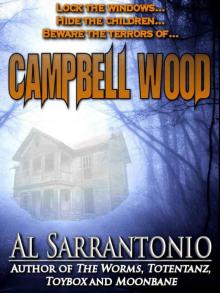 Campbell Wood
Campbell Wood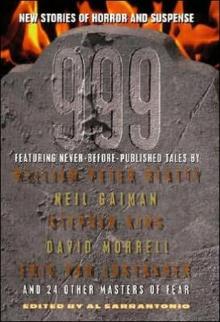 999
999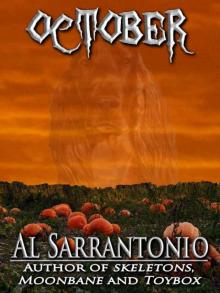 October
October Sebastian of Mars
Sebastian of Mars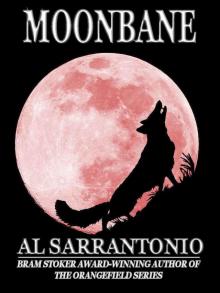 Moonbane
Moonbane Totentanz
Totentanz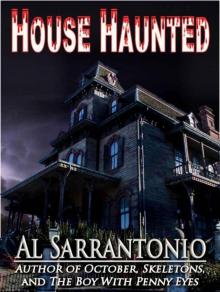 House Haunted
House Haunted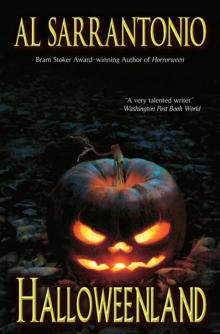 Halloweenland
Halloweenland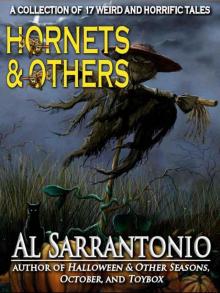 Hornets and Others
Hornets and Others